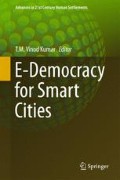Abstract
Cities are for citizens and also ‘by & of’ its citizens. However, citizens’ participation which is one of the key agenda of Good Governance is generally in conflict when it comes to urban planning process which is more technocratic with a top down approach. Citizens generally are more aware and concerned about private interest rather than city as whole when they participate about the Development plans and neighborhood when we consulted on the Town Planning Schemes (TPS). In the context of Urban Planning when the plans are laid out, regulations are drafted which is meant for the citizens ought to ensure the factor that these documents are “by” & “of” the citizens indicating proper consultation in the process. Gujarat has been one of the progressive states of India so far as rate of urbanization is concerned and Town Planning schemes which have been practiced since early twentieth century has been a model for other cities. Practitioners state that the process for preparing a TPS as prescribed in GTPUDA (Gujarat Town Planning and Urban Development Act, [3]), and its rules, seem to be a complex and long process involving over 50 steps that can take a maximum of four years and one month as provisions of the GTPUDA, but in practice takes much longer. Administrators of central government are leading to educate Indian citizens to practice the excellent platform of E-Governance, which shall enable the citizens to express their thoughts and willingness in a more free way. The intention of this chapter is to throw light on ICT, specifically the planning process adopted in a fast growing state of Gujarat. Apart from that, issues regarding E-Democracy initiatives are also addressed. Though the process of E-Governance is in its infant state from user’s point of view, but this will surely gain momentum in the days to come. This practice will instil high-democratic values and plan implementation within desired time frame.
Access this chapter
Tax calculation will be finalised at checkout
Purchases are for personal use only
References
Ballaney S (2008) Town planning mechanism in Gujarat, India by Shirley Ballaney. World Bank Institute. Retrieved from http://hcp.co.in/file_manager/publications/Town-Planning-of-Gujarat_Research-Paper.pdf
Freeman J, Quirke S (2013) Understanding E-democracy. JeDEM 5(2):141–154
Gujarat Town Planning and Urban Development Act-1976
Mahendra B, Harikrishnan K, Krishne G (2010) Urban governance and master plan of Bangalore City, pp 1–18
Panchal K, Salgaonkar J, Vyas DP, Mathews R (2016) Scaling up land readjustment for urban and industrial development through the town planning scheme in Dholera, Gujarat, India
Promises and Problems of E-Democracy, OECD-2003
Taylor P (2004) Planning for a better future. Habitat Debate 4(4):4
UN Habitat. (2009). Planning sustainable cities (2009th ed.). UN Habitat
Web
Acknowlegement
The Authors acknowledge the valuable efforts of Mr. Devang Kapadia, Research Student, Urban Planning, Civil Engineering Department, SVNIT, Surat, Gujarat, India for his contribution in analysis of TP Schemes process and suggestions on process re-engineering.
Author information
Authors and Affiliations
Corresponding author
Editor information
Editors and Affiliations
Rights and permissions
Copyright information
© 2017 Springer Nature Singapore Pte Ltd.
About this chapter
Cite this chapter
Desai, R.D., Macwan, J.E.M., Chauhan, K.A., Tripathy, P. (2017). Preparation of Town Planning Schemes—An E-Democracy Framework for Citizen Centric Planning. In: Vinod Kumar, T. (eds) E-Democracy for Smart Cities. Advances in 21st Century Human Settlements. Springer, Singapore. https://doi.org/10.1007/978-981-10-4035-1_9
Download citation
DOI: https://doi.org/10.1007/978-981-10-4035-1_9
Published:
Publisher Name: Springer, Singapore
Print ISBN: 978-981-10-4034-4
Online ISBN: 978-981-10-4035-1
eBook Packages: Earth and Environmental ScienceEarth and Environmental Science (R0)

